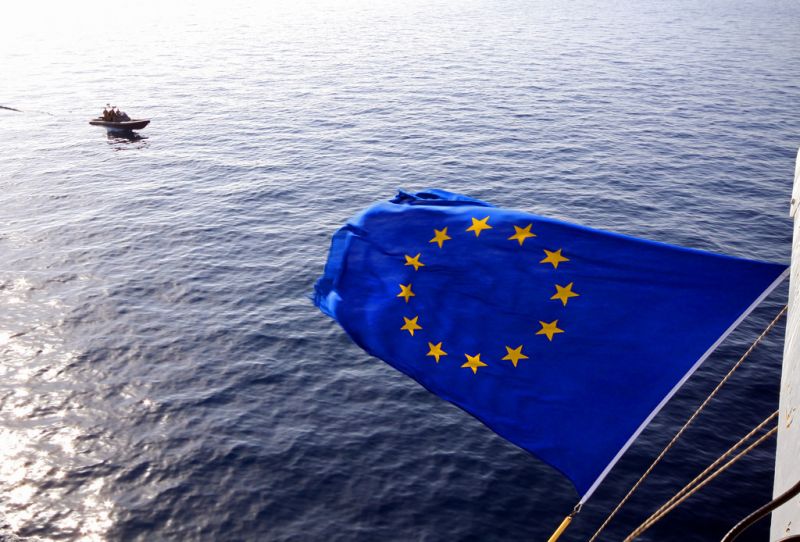EU Seeks to Give Millions Better Access to Drinking Water
Published on by Water Network Research, Official research team of The Water Network in Government
Revised European legislation proposed by the European Commission will improve the quality of drinking water and access to it as well as provide better information to citizens.
The right to access essential services of good quality, including water, is one of the principles of the European Pillar of Social Rights unanimously endorsed by Heads of State or Government at the Gothenburg Summit.

Representative image, source: Flick, author: eunavfor , labeled as reuse
These legislative proposal aims to guarantee this right and thereby responds to the first-ever successful European Citizens' Initiative, "Right2Water", that gathered 1.6 million signatures in support of improving access to safe drinking water for all Europeans. In addition this proposal seeks to empower consumers ensuring that water suppliers provide consumers with clearer information on water consumption, on the cost structure as well as on the price per litre allowing a comparison with the price of bottled water.
This will be contributing to the environmental goals of reducing unnecessary plastic use and limiting the EU's carbon footprint, as well as to the achievement of the Sustainable Development Goals.
First Vice-President Frans Timmermans said: "Citizens have made their voice loud and clear through the European Citizens' Initiative, calling for action to have a guaranteed access to safe drinking water. We have heard and heeded their call and carried out a thorough analysis of our existing legislation. Today we are therefore proposing to modernise our EU law, improving the quality of drinking water and increasing the access of citizens where it matters most. Together we can and must protect the health and safety of our citizens."
Vice-President Jyrki Katainen , responsible for growth, jobs, investment and competitiveness said: " With this proposal we facilitate the transition to a circular economy, helping Member States manage drinking water in a resource-efficient manner. It implies reduction of energy use and unnecessary water loss. Thanks to increased transparency it will also empower consumers and push them towards more sustainable choices, for example using tap water."
Most people living in the EU enjoy very good access to high quality drinking water. This results from long standing EU legislation protecting Europeans ensuring that they have access to high quality drinking water. The Commission wants to make sure that this high quality is preserved in the long run. The rules which the Commission proposes to update today will improve water quality and safety by adding new and emerging substances to the list of criteria for determining water safety (such as legionella and chlorate). These additions take account of the latest scientific knowledge and recommendations of the World Health Organisation.
The new rules will require Member States to improve access for all people , especially for vulnerable and marginalised groups who currently have difficult access to drinking water. In practice, that means setting up equipment for access to drinking water in public spaces, launching campaigns to inform citizens about the quality of their water and encouraging administrations and public buildings to provide access to drinking water.
Another important change in the legislation will give the public easy, user-friendly – including online – access to information about the quality and supply of drinking water in their living area, improving confidence in tap water. According to estimates, the new measures would reduce potential health risks associated with drinking water from 4% to below 1%.
Lower consumption of bottled water can in addition help households in Europe save more than €600 million per year . With improved confidence in tap water, citizens can also contribute to reducing plastic waste from bottled water, including marine litter. Plastic bottles are one of the most common single use plastic items found on European beaches. With the update of the Drinking Water Directive, the Commission takes with an important legislative step towards implementing the EU Plastics Strategy presented on 16 January 2018.
Better management of drinking water from Member States will avoid unnecessary loss of water and contribute to lowering the CO2 footprint . The proposal will therefore make a meaningful contribution to reaching the 2030 Sustainable Development Goals (Goal 6) and the Paris Agreement objectives on climate change. The new risk-based approach to safety will help to carry out safety checks in a more targeted manner where risks are higher. In parallel, the Commission will also accelerate work on standardisation to ensure that construction products in the water sector across the EU's internal market, such as pipes and tanks, do not pollute drinking water.
Background
Most people living in the EU already enjoy very good access to high quality drinking water, especially compared to some other regions in the world, thanks in part to over 30 years of EU legislation on drinking water quality. This policy ensures that water intended for human consumption can be consumed safely, protecting citizens' health. The main pillars of the policy are to:
- Ensure that drinking water quality is controlled through standards based on the latest scientific evidence;
- Secure an efficient and effective monitoring, assessment and enforcement of drinking water quality;
- Provide consumers with adequate, timely and appropriately information.
The revision of the Drinking Water Directive 98/83/EC was included in the Commission's 2017 Work Programme, as a direct follow up to the Right2Water European Citizens' Initiative. The proposal follows the REFIT Evaluation of the Drinking Water Directive and is accompanied by an Impact Assessment and by WHO recommendations.
Source: European Commission
Media
Taxonomy
- Public Health
- Drinking Water Security
- Drinking Water Treatment
- Quality
- Policy
- Water Law
- Water Quality
- Governance & Policy
- International Law
- Drinking Water Managment
- Drinking Water
- Water Quality Management